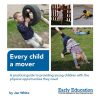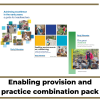DfE launches school-based nursery pilot
The Department for Education (DfE) has today launched a “test and learn” pilot for its planned expansion of school-based nursery provision. Under the scheme, primary
The DfE have issued documents to support schools and settings to understand how to report to the Early Years Census in the context of the pandemic. The guidance states: “The intention is to ensure parity of approach to counting of funded entitlements across both the School Census and the Early Years Census.”
This includes the guidance:
Open providers must ensure that they are able to meet statutory requirements to ensure safe and high-quality early education and childcare, in line with the Early Years Foundation Stage (taking into account the disapplications and modifications in place) and COVID systems of control.
The Early Years Census 2021 is intended to reflect the provision made available to parents/guardians, and a provider’s usual expected attendance in the week commencing 18th January 2021. This remains the guiding principle behind all the following scenarios outlined. The intention is to ensure parity of approach to counting of funded entitlements across both the School Census and the Early Years Census.
Where a provider is counting a child on the census, the place must be genuinely ‘available’: this means a provider must not count a child where they have furloughed the staff who would be required to deliver the child’s place.
The first section relates to open PVI settings within which children are benefiting from their funded entitlements in census week. We anticipate that attendance will be lower than previous years within these settings.
• In summary we have taken the view that where a child is reasonably expected to attend Early Years provision, and that provision is made available to them by the provider, their expected hours should be recorded in the Early Years Census. This means children who, were it not for the impact of coronavirus on either their own personal circumstances or on the operation of their Early Years setting, would be attending Early Years provision. This includes children who have previously attended the provision and children who were expected to start attending the provision in January.The second section relates to closed PVI providers, where children are therefore not benefiting from their funded entitlements in census week.
• Where the provider chooses not to offer the entitlements – i.e. to close, or only offer a limited provision to children of key workers – then then they should not make a return for a child who is not being offered a place.
• Where the provider is temporarily closed due to circumstances such as staff infections or isolation periods, they should return their expected levels of provision for census week.
Ths includes the guidance:
Early years – funded hours, extended hours and hours at setting
Early years provision should remain open and continue to allow all children to attend full time or their usual timetable hours. This includes early years registered nurseries and childminders, maintained nursery schools, as well as nursery classes in schools and other pre-reception provision on school sites. This is the default position for all areas irrespective of national lockdown restrictions. It is the government’s intention for there to be parity of approach between the school census and the early years’ census.Funded hours, extended hours and hours at setting for pupils who are in attendance during census week should be recorded as normal.
Funded hours, extended hours and hours at setting should be recorded as the number of hours the pupil would normally be expected to attend during census week in the following circumstances:
• Pupils are absent because they are self isolating
• Parents have chosen not to send their child to nurseryWhere the parent has requested a change to the funded hours entitlement taken at the establishment, schools must record the revised funded hours.
Funded hours, extended hours and hours and setting should be recorded as zero in the following circumstances:
• The nursery provision has chosen to close
• Where the child is not attending because the school has chosen to restrict nursery provision to certain groups of children (e.g. vulnerable children and children of key workers)
The Department for Education (DfE) has today launched a “test and learn” pilot for its planned expansion of school-based nursery provision. Under the scheme, primary
Ofsted has today published its response to the “Big Listen” consultation. For the early years, it undertakes to: On the differences between early years and
We welcome the Department for Education’s announcement that the government are moving ahead with their manifesto commitment to scrap single-word Ofsted judgements for schools, effective immediately,
On 10 June, Labour announced their plans for “over three thousand new nursery classes across England to open up access to childcare hours for families”,
The Conservative Manifesto has promised to extend Family Hubs to all local authorities. This would both extend funding for the 75 local authorities where they
The Lib Dems have published their manifesto, including commitments to incorporate the UN Convention on the Rights of the Child into UK law and to
A report published by the National Audit Office (NAO) today finds that the timetable for the roll-out of the new funded early education and childcare
A new campaign to boost recruitment to the early years sector in England is being launched today by the government. The government press release says:
The Department for Education has today published its response to the EYFS consultation conducted in the summer. The changes will be implemented from January 2024
DfE has today launched a consultation on the new funding rates which will apply for 2-year-olds and under 2s when the new entitlements are introduced
The Department for Education has today announced that the extra £204m for early years announced in the budget will be allocated to local authorities as
In a speech today, Kier Starmer will set out Labour’s plans to expand opportunity via five “missions” including “Early years reform – to boost child development with an
The Department for Education (DfE) is currently consulting on proposals to amend the Early Years Foundation Stage. They propose relaxing the requirements around the minimum
DfE has issued slightly more detail about the planned uplift in the hourly rates for the current and new entitlements, following the announcements in the
Today, teachers from the National Education Union are striking, including many working in nursery and reception classes. In the last week, the Department for Education
We welcome the news that our President, Professor Cathy Nutbrown, has been made a Dame in the year’s New Years Honours list. This is much
The government’s latest changes to the early years funding formulae bring two key changes which we pointed out in our response to the consultation would
DfE have today announced the early years funding settlement for 2023-24, which leaves the early years sector struggling on below inflationary increases. While an additional
Ofsted’s latest annual review highlights the impact of recruitment and retention challenges and finds a link between inspection outcomes and the proportion of graduates in
The tenth early years minister in ten years, Kelly Tolhurst, is now in post. It’s good news that early years is part of a Minister
Comparing figures from January 2022 and January 2020, progress is being made towards previous levels of take up of funded early education. Latest figures from
Early Education welcomes the news that the new National Plan for Music Education has been extended to cover the early years. We are glad to
The Times Education Commission has today published a report which calls for “A significant boost to early years funding targeted at the most vulnerable and
Cathy Nutbrown, President of Early Education The twelve sessions of the May Annual National Conference 2022 left me reflecting on a strong thread which I
Ofsted has today launched a new five-year strategy. Elements of this which affect the early years include commitments to “simplify the regulatory regime for childminders”
We welcome the government’s new Sustainability and climate change strategy for education and children’s services, and that early years is reflected through a range of
A survey of maintained nursery schools carried out by Early Education in June 2021 has found increasing demand from children with SEND in the current









Early Education
2 Victoria Square
St Albans
AL1 3TF
T: 01727 884925
E: office@early-education.org.uk